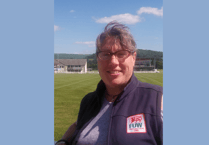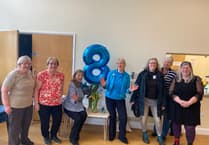A WRITER from Tirabad has won the short story competition at the Wells Festival of Literature.
Nicola Ratnett, 55, who is originally from Bristol, was shortlisted for two of her short stories in the competition.
The winning entry, called The Last Word, is a skin crawling tale about a surprise box left outside the front door for the protagonist, Ilsa Stanhope, when she returns home from work.
The peculiar story reveals that the box contains the tattooed skin of her ex-husband before taking the reader with Ilsa as she decides on what to do next.
Nicola said the story was based on a heavily tattooed friend of hers. She said that her friend’s wife always said that he’d spent too much money on his beautiful tattoo for him to be buried or burned with it when he dies.
Nicola, who received a cash prize and will be published on the festival’s website, said: “I was so excited when I found out I’d won. If I could have danced on the table then I would have. I write peculiar stories and it seems they like peculiar.”
Following her success in the competition, Nicola said she also wanted to thank her friend and local councillor Bill Hill. She said: “Mr Hill has been my proofreader and he’s been great. He doesn’t miss a thing. He is invaluable to me.”
Nicola’s second short story in the competition, Making a Killing, was based on one of her friends who died of cancer. She said her friend was unfortunately taken in by people who scammed her out of £20,000 for alternative treatments before she died leaving her penniless.
The story is about a woman in the same predicament as Nicola’s friend, but is written from her sister’s viewpoint. Nicola said: “I wrote it from the perspective of her sister who is on a mission to kill the person who did this to her. But when she gets there she can’t go through with it. He dies in it anyway, so he does get his comeuppance.”
Nicola, who worked as a model train engineer before she took up writing, was also shortlisted in the competition three years ago, but didn’t win.
On that occasion she went to the awards ceremony but this time she was unable to because of a mobility disability. She said: “I couldn’t go this year because of my mobility issues and I didn’t want to go through all of that just to find out I hadn’t won.
“The last time my friends arranged it so I could go because I need a lot of help. This year I just couldn’t face it or having to ask people. I sadly couldn’t be told until they announced it and when they called me to say I’d won it they told me that they had so wanted to tell me earlier! I received my certificate in the post yesterday.”
Nicola started writing regularly when her grandmother bought her a diary when she was six years old. She wrote in the diary every day and has kept one religiously ever since.
Nicola, who said she gets ideas from all over the place including a recent visit to a koi pond, started writing to be published and for competitions when she could no longer work. She said: “We don’t have internet or TV here, so I sit and write books and short stories. I’ve always been self-employed, but I can’t really do much any more. I’m in lots of pain all the time, but I don’t want to be an old lady in front of the telly, even if I’m only 55 and I don’t own a telly.
“The writing is to stop myself going mad, so I sit and play with my imaginary friends – the characters in my books. It gets to a point when you’re writing where they’re telling you what they’re doing and about how they’re feeling instead of you telling them. It’s really quite an involved world.”
Honno, the Welsh Women’s Press based in Aberystwyth, are currently looking at three novels written by Nicola with the intention of publishing at least one of them. She said: “I don’t know which of the three will be published. It’s taken quite a while, it’s a long process with sending them off and everything so I’ve been entering competitions while I’ve been waiting.
Nicola has written six crime-based novels which all revolve around the Tirabad area. She takes real issues and turns them into stories to educate readers. She said: “The last one was on slavery in Wales because that’s a big problem.
“The current one I’m writing is on cults – they were big in the 1980s because there was so much fear about cults taking your friends or your children, but they don’t seem to be talked about as much now and yet there are 1,500 different cults in the UK now. People are still scammed and caught out by these awful things.”




